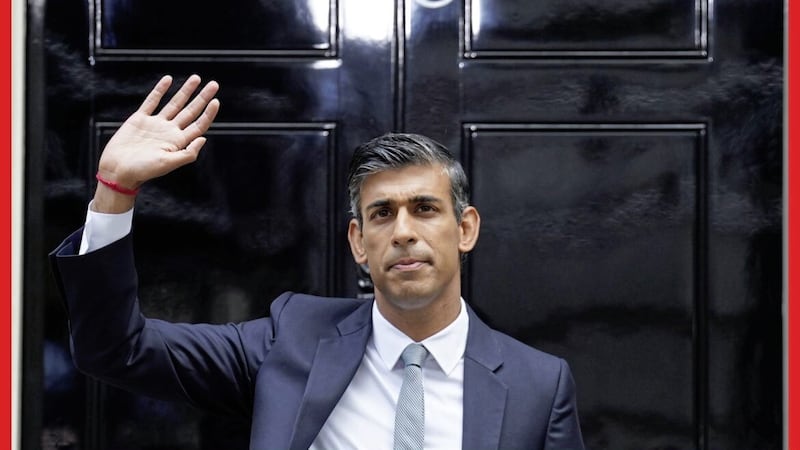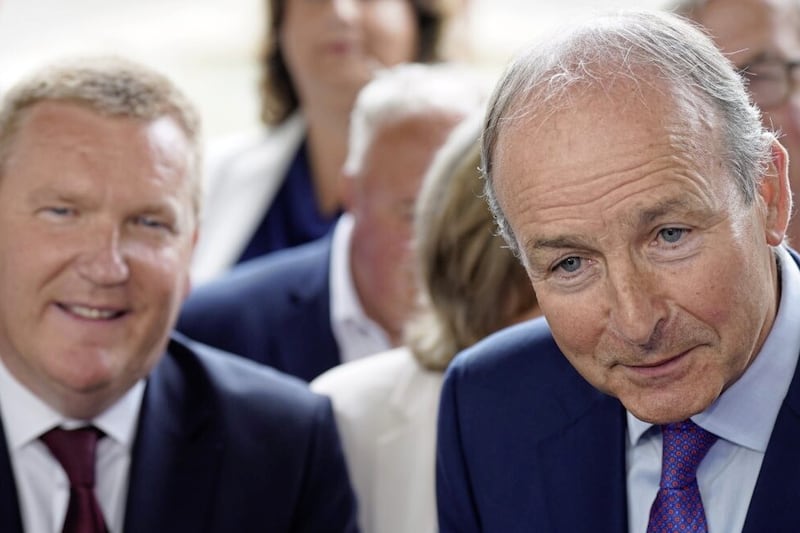When it was announced on Monday that Rishi Sunak was to become the third prime minister of Britain in as many months, one of the lighter moments on social media was the conspiracy theorists tweeting and posting about how Rishi was an anagram of Irish and that he would ultimately stab unionism in the back.
That would be a change. The previous two British prime ministers stabbed the DUP in the front and everyone but the DUP saw it coming.
Of course, the real conspiracy is that Rishi Sunak is of Indian descent and in a matter of weeks, Leo Varadkar (also of Indian descent) will resume the role of taoiseach as part of the power-sharing arrangement with Fianna Fáil. In a long-planned and carefully choreographed series of moves, the two men will advance the reunification of Ireland as reparation and revenge for the destruction and subjugation of their ancestral homeland.
It's not true, but it would make for a great movie as the two men embraced in the courtyard of Dublin Castle on referendum day as a metaphorical sun began to set over the empire and the credits rolled.
There was a notable change in the mood music from the Irish government this week. Up until now, Michéal Martin has taken a softly-softly approach to avoid upsetting unionism, repeating that talk of a border poll is divisive and now is not the time. But even his patience appears to have worn thin if his speech to the British Irish Parliamentary Assembly on Monday is anything to go by. He said: “the decision of one political party not to participate in the Northern Ireland Executive runs counter to democracy and risks undermining the faith of people in the potential of politics.
“This is a moment for politicians to embrace their responsibilities to the voters of Northern Ireland. It is time for the Assembly to function and a new Executive to be established before the 28th of October deadline.
Failure to do this is a denial of the mandate voters in Northern Ireland gave to their political representatives.”
This is about as strong a statement as Martin has made to date. Unionism should take note, given that this is the man who may be tánaiste before the end of the year.
I am loathe to make predictions because I am notoriously bad at them but it would seem that Rishi Sunak is a pragmatist and will try to arrive at a negotiated settlement with the EU rather than progress a protocol bill which will be altered significantly by the House of Lords.
The prospect of a trade war with the EU would not be good for Britain in the financial markets, so the protocol will have to be dealt with sooner rather than later.
The question become how much movement is enough for the DUP to return to the executive? An assembly election does not guarantee a Stormont Executive as we well know.
The protocol issue has been a convenient fig leaf to not have to share power with a Sinn Féin first minister. But by continuing down this path, the prospect of joint authority between Dublin and London becomes a much greater one, as was very forcefully put by Jim O’Callaghan TD this week.
If the consequences of failing to return to the executive is that Dublin will have a say in the internal affairs of the north, the DUP would never recover electorally from that.
Leo Varadkar’s attitude has been quite different from Michéal Martin. Speaking at the Ireland’s Future event on October 1, he set out a vision of an incremental process of reunification where there were limited structural changes in the short term, but that the fundamental change would be that the sovereign government in the north would be an Irish one.
That is quite a statement from an incoming taoiseach but it is a statement that follows up very clearly on the pledge he made in 2017 that the nationalist people of the north would never again be left behind by an Irish government. He said it and it looks like he meant it.
It is just over two years at most until the next Irish general election. If the polls are anything to go by, Sinn Féin will be the largest party and will lead the government. In that scenario, joint authority 2.0 would have significantly more teeth.
If the DUP’s stated intention is truly to safeguard the Union, then the least-worst option for them is to go back into the Stormont Executive. In that role there is an opportunity to prioritise economic spend, legislate around health and education and hold your partners in government to account.
In the face of the worst economic crisis in over a generation, trundling on through an election and another stalemate where MLAs continue to be paid their full salaries is unforgivable when so many people will go cold and hungry.
I don’t know how the DUP can have that on their conscience.








